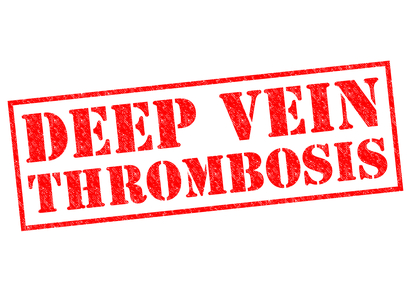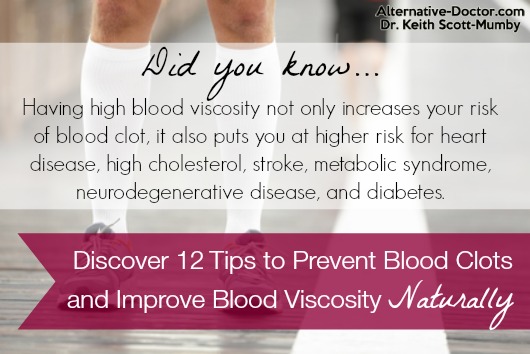The medical term for a blood clot is deep vein thrombosis (DVT). They are typically located in the arms, legs, or groin area.
It is a serious condition that can worsen if small pieces of the clotted blood break loose and travel through your blood stream to other parts of your body. Check out the typical causes for blood clots. Many can affect either gender at any age.
Learning how to prevent blood clots is crucial to your health!
Primary Risk Factors for Blood Clots
- Sedentary lifestyle or excessive travel requiring you to sit for long periods
- Limited mobility – confinement to bed or wheelchair
- Recent surgical procedure or invasive procedure
- Smoking
- Hormonal medications such as birth control and hormone replacement drugs
- Pregnancy or recent delivery
- Traumatic injury resulting in a deep bruise, lumps, or bone breaks
- Obesity
- A family or personal history of varicose veins or blood clots
- History of cancer, heart disease, stroke, or paralysis
- Irregular heartbeat (cardiac arrhythmia)
- Being 65 years or older
- Having thicker more viscous blood
Having high blood viscosity (how thick or sticky your blood is) not only increases your risk of blood clot, it also puts you at higher risk for heart disease, high cholesterol, stroke, metabolic syndrome, neurodegenerative disease, and diabetes. If you are concerned about your blood viscosity, request that your doctor do a Complete Blood Count.
Blood viscosity determines how your blood flows through your blood vessels, how hard your heart has to work to pump the blood, and the friction caused to your vessels from blood flow. High viscosity blood can directly affect the amount of oxygen and nutrients that is delivered to your cells and organs.
 Common Blood Clot Symptoms
Common Blood Clot Symptoms
- Aching, tenderness, or pain in arms or legs
- Redness on the surface of your skin
- Sweating
- A spot that feels warmer than the rest of your skin
- Fatigue
- Unexplained swelling in limbs
If the particles that break loose from a clot end up in your lungs, it’s known as a pulmonary embolism and is an emergency situation. You must seek immediate medical attention.
You may experience difficulty breathing, a persistent cough (sometimes with blood), pain in your chest, rapid heartbeat, feeling dizzy or faint, or a low-grade fever.
12 Tips to Prevent Blood Clots and Improve Blood Viscosity Naturally
1. Do not wear excessively tight clothing (especially when traveling)
2. Occasionally elevate your legs (6 inches above the level of your heart)
3. Move around for at least half an hour each day
4. Ask your doctor about non-hormonal birth control options
5. Consider compression stockings if you have multiple risks for blood clots
6. Lower the amount of salt in your diet (dump the junk!)
7. During long periods of travel, take time to move or stretch
8. Quit smoking
9. Be cautious of “impact” injuries to your arms or legs
10. Keep your feet flat on the floor while sitting (don’t cross your ankles)
11. Drink plenty of water
12. Get a VieLight for improved blood viscosity!

Alternatives to Anticoagulant Drugs
Conventional medicine’s response to blood clots is to prescribe an anticoagulant – also known as a blood thinner. The side effects of these drugs include the inability to stop bleeding if you cut yourself. If you have a wound that will not clot, you should visit the emergency room and let them know you’re taking a prescription blood thinner.
You need to do everything possible to improving your body’s “delivery system” (the blood). Put an end to high viscosity blood and thin it back to normal. Improve your heart health, boost the blood flow to your brain, and prevent blood clots.
I have a terrific way to reduce your blood viscosity; to get it back to the super fluid it was when you were a youngster in the prime of life! Lower inflammation with low-level laser light administered to the blood. No one should be without one of these super new devices that will thin your blood and save your life!
VieLight Nasal Laser Therapy Device
After a lot of searching, I decided on the VieLight as your best possible option for self-administration of life-saving low-level intra-nasal laser light therapy (L4T). The device delivers 635 nm frequency light direct into the blood, via the network of nasal capillaries.
It is also sufficiently bright to shine a certain amount of light directly to your brain, via the thin skull bones at the back of the nose.
The price is outstanding, it’s small enough to slip in your pocket or purse, and most importantly, it is SAFE and EFFECTIVE. If you’re interested in how to prevent blood clots and improve blood viscosity, check out the VieLight here.
The post How to Prevent Blood Clots appeared first on Dr. Keith Scott-Mumby.

